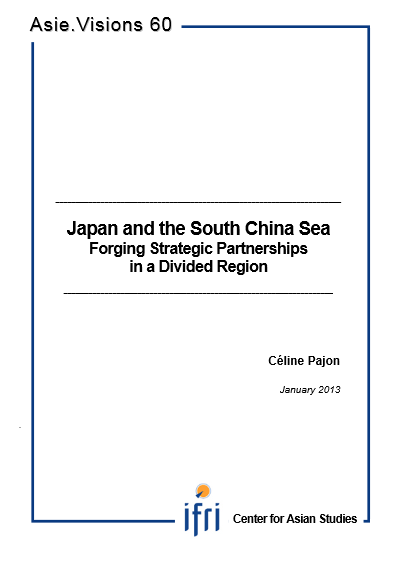Japan and the South China Sea: Forging Strategic Partnerships in a Divided Region

In the midst of growing tensions with China, Japan is deepening its strategic engagement in Southeast Asia. Preserving stability in the South China Sea, which is threatened by renewed frictions around contested territories, is a vital interest for sea lane-dependent Japan. Moreover, Tokyo considers Southeast Asian countries as crucial partners in balancing against an increasingly powerful and more assertive China.
Therefore, Tokyo is stepping up its security cooperation in the region through the promotion of regional maritime and security institutions, but more importantly, by building strategic partnerships and helping to foster the maritime capacities of key like-minded countries (notably Indonesia, the Philippines and Vietnam).
These initiatives augment the “great game” of influence currently underway in Southeast Asia and in which Japan is soft-balancing China and supporting a more sustainable US presence. Still, forging strategic partnerships is not an easy task as ASEAN countries, if increasingly polarized, are not passive in the face of the great powers contest.
As East Asia grows seemingly more divided and as a competition for influence is flaring up, Europe is politically absent. Yet, expectations for more politico-military involvement from European countries in the region do exist, especially in Japan. If discussions about a possible “EU pivot” to East Asia are developing, many obstacles and limitations still constrain an expansion of European influence in the region.

Available in:
Regions and themes
ISBN / ISSN
Share
Download the full analysis
This page contains only a summary of our work. If you would like to have access to all the information from our research on the subject, you can download the full version in PDF format.
Japan and the South China Sea: Forging Strategic Partnerships in a Divided Region
Related centers and programs
Discover our other research centers and programsFind out more
Discover all our analysesJapan’s Takaichi Landslide: A New Face of Power
Prime Minister Sanae Takaichi has turned her exceptional popularity into a historic political victory. The snap elections of February 8 delivered an overwhelming majority for the Liberal Democratic Party (LDP), driven by strong support from young voters, drawn to her iconoclastic and dynamic image, and from conservative voters reassured by her vision of national assertiveness. This popularity lays the foundation for an ambitious strategy on both the domestic and international fronts.
The U.S. Policy Toward Taiwan Beyond Donald Trump: Mapping the American Stakeholders of U.S.-Taiwan Relations
Donald Trump’s return to the White House reintroduced acute uncertainty into the security commitment of the United States (U.S.) to Taiwan. Unlike President Joe Biden, who repeatedly stated the determination to defend Taiwan, President Trump refrains from commenting on the hypothetical U.S. response in the context of a cross-Strait crisis.

China’s Strategy Toward Pacific Island countries: Countering Taiwan and Western Influence
Over the past decade, China has deployed a diplomatic strategy toward the Pacific Island Countries (PICs). This strategy pursues two main objectives: countering Taiwan's diplomatic influence in the region and countering the influence of liberal democracies in what Beijing refers to as the "Global South."

Opening up the G7 to South Korea to Address Contemporary Global Challenges
The G7’s global influence has diminished as powers like China reshape international governance through initiatives such as BRICS and the Shanghai Cooperation Organisation (SCO). With the G7 now representing just 10 per cent of the world’s population and 28 per cent of global GDP, its relevance is increasingly questioned.










